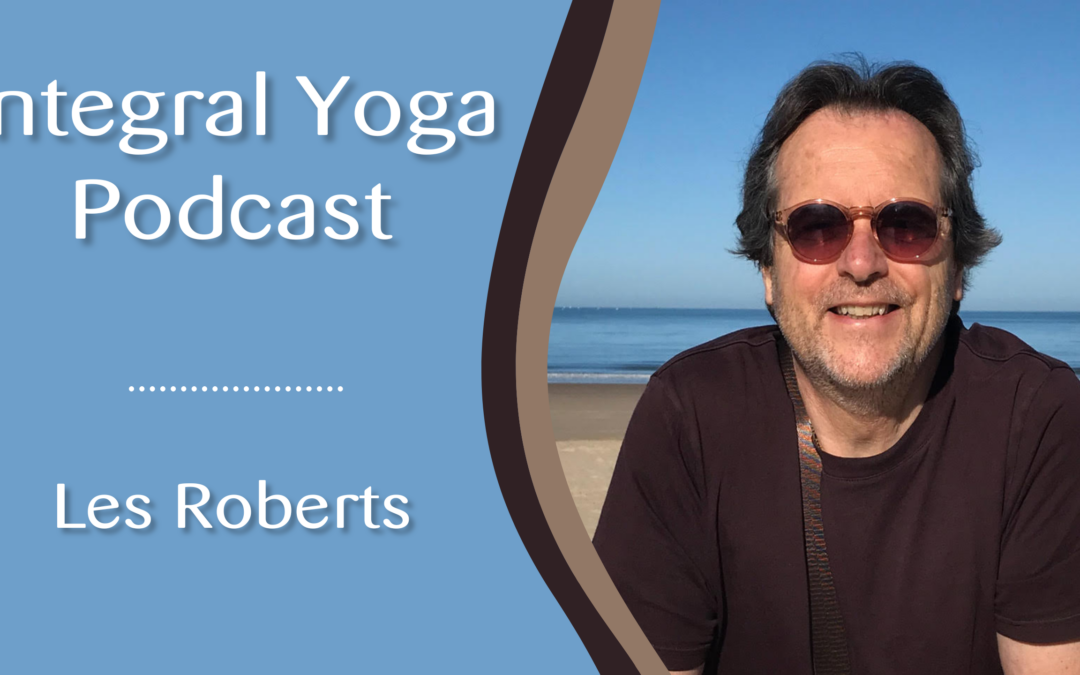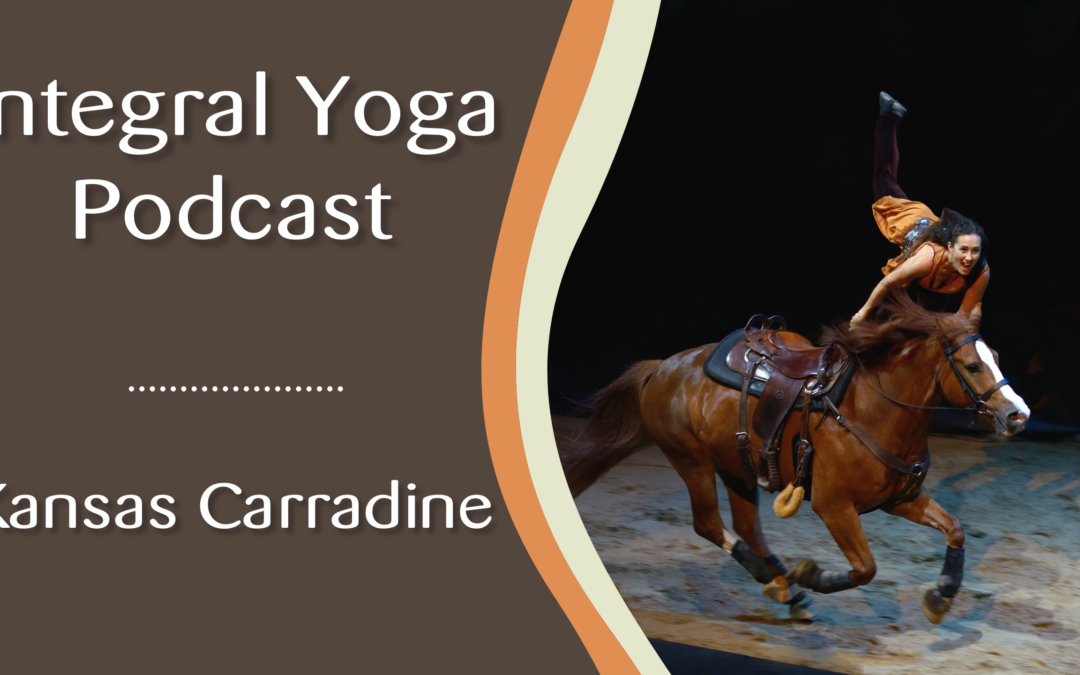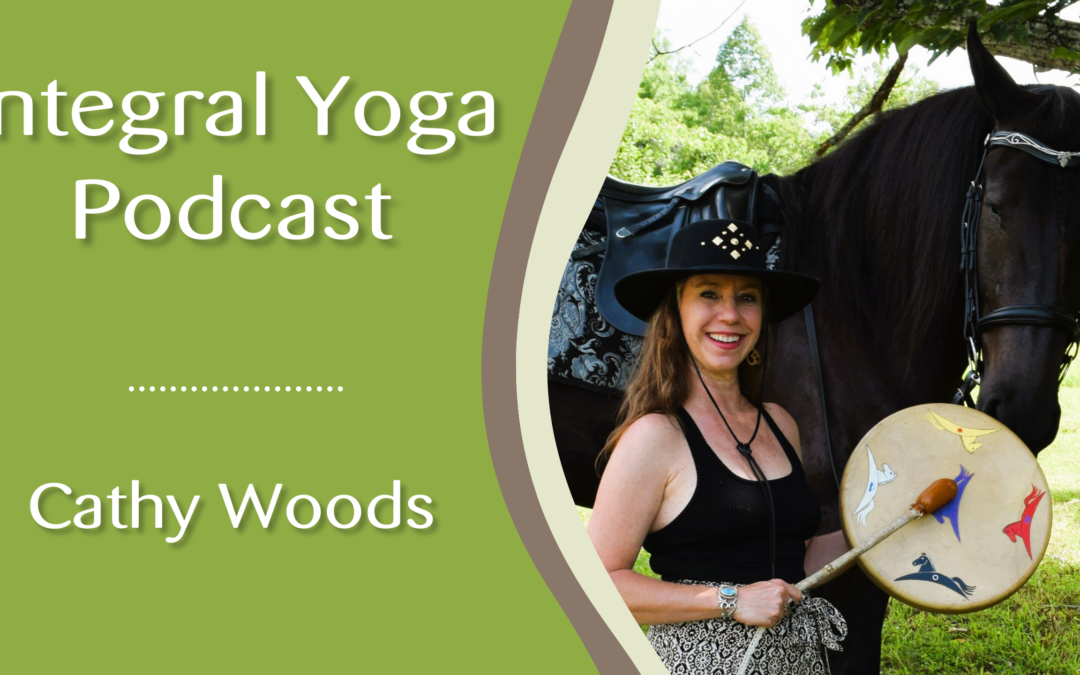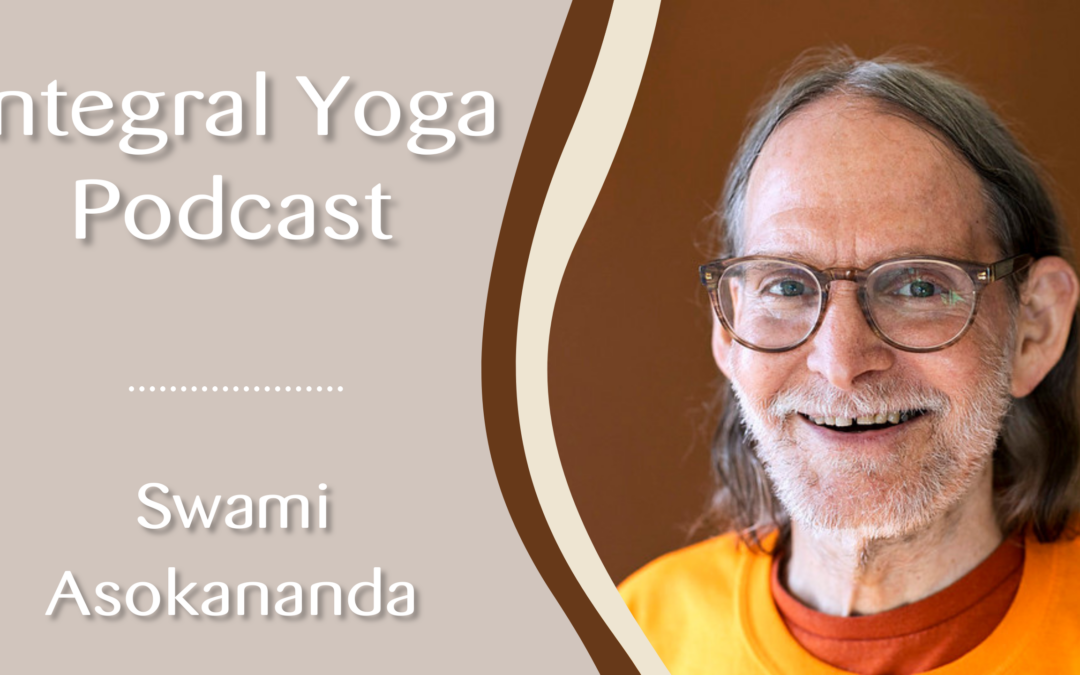Hamsa 0:00
Here in New York, we certainly have a challenge in that. Right now we're going through a transition and in assessing whether or not staying within our building in Greenwich Village, is the right choice for us.
Avi 0:19
Seems like there's a much better chance that I'll make better decisions when I have faith than when I don't.
Hamsa 0:25
The path to where you're going is only straight in hindsight,
Avi 0:29
how much do I believe in this? Right? Is this just a little thing? Or am I am I really serious about this in a good way? This is this is my core belief. And this is the way I see the world.
Hamsa 0:41
I think for me, it started with the Yantra.
Avi 0:49
Alright, Hello, and welcome to the interval yoga podcast. Today, I am joined by Hamsa Cho a little bit about Hamza. She currently serves as the Executive Director for integral yoga Institute in New York. She has 20 years of business and consulting experience, bringing yoga to all adds excitement to her life. So Hamza, thanks so much for for taking the time to be here today.
Hamsa 1:14
Yeah, thank you all the for having me. I appreciate the invitation. And I'm, I always love any, any opportunity to talk about yoga. So I appreciate this.
Avi 1:28
Absolutely. So I'll start with kind of like a bigger yoga life question that I like to ask. And it's just what matters to you.
Hamsa 1:40
What matters to me family and love is your is really what matters to me. And I think if that is the root of everything that we do it is that love, enjoy war kind of pervade everything. Thinking of everyone as family I think is, is really important. And loving everyone as that family I think is really important. And I guess to me, that is going back to your yoga question that is Yoga is is love of family of realizing that we are just one and and thinking about love is Ahimsa. And yeah.
Avi 2:35
non violence. And so yeah. So did that idea of us kind of all being one and connected with each other. Did that come easily to you? Or was there any resistance towards kind of stepping into that? awareness?
Hamsa 2:54
Wow, what a great question. Wow. I think for me, it started with the Yantra. And the concept of truth is one has are many. And for me, when I found in Tripoli yoga and learned about that concept, it really, it didn't necessarily shift my mind, because it was something having grown up in a Christian family and going to church every have raised. You know, I already had a sense of something greater than myself within my life. But the truth is one or many really helped me to see it in a different way. And and I think that became the framework of recognizing that it all is one. So if you think of all of the religions as the same truth, I think we it's easier to make that jump to as people, we have these differences, but we really are just one. I don't know if that makes sense at all.
Avi 4:17
I think it does. It might be a little similar to me. So it's almost like I hear you saying that. Seeing the Yantra with all the religions kind of united together in in their core truth. That was maybe easier to digest or something that maybe you already intuitively felt a little bit or when when you saw that you're like, Okay, yes, that makes sense. And then from that kind of a larger understanding of our unity expanded from there.
Hamsa 4:49
Absolutely. Yeah. Thank you for for synthesizing for synthesizing that. Yeah. You know, and this goes back to your question and how it was so great it is these things that I feel internally, but I don't know if I've necessarily thought through kind of that journey. So I really appreciate that question.
Avi 5:15
Yeah, it feels a little tricky for me, like moving forward with this awareness of, of, of our connection. Right? It's like, how am I, as this one being relating to, to the world? Yeah, cuz it's such a different outlook, I don't know about you. But you know, I, I grew up a lot with kind of the, the mindset of, you know, life is maybe hard, and I need to survive, and I need to scrap and claw to find my place of survival a little bit, it was definitely not one of kind of collaboration and teamwork, and we'll support each other and that sort of thing. So I'm just curious if you have any kind of reflections of how you kind of navigate this dichotomy between the two worlds? Yeah.
Hamsa 6:09
I think that's, that's the practice. I think that's the practice is we naturally see ourselves as desperate, and our minds get caught up in that. And, and, and we see that we frame things as difficult. So I think that's completely natural. And I think part of for me, my practice is, is shifting my view on it. And I, this brings me back to a, you know, one of the yoga concepts of recognizing that we view everything through the lens of our experience, and that there is a completely different way to look at the same thing that we're experiencing. So for me, talking about challenge and, and suffering. One of the ways that I use to help me reframe is how is this helping me to be a better person or a stronger person? Or what are the lessons here that are going to propel me to whatever that next level is? And so it, it, it changes the way I it changes the way you experience it. And, and so, and I guess for me, anytime I feel any discomfort, I always bring my yoga lens to and I say okay, what, what can yoga Teach me here? How am I seeing the separateness of people? How am I seeing something that's a difficulty? Perhaps in a way that's making it more difficult for myself. And, and I think being open to that changes is the challenge me well?
Avi 8:30
Yeah. made me think about compartmentalization. Right and directly in relationship with yoga. I don't know about about you, but my entry into yoga was was definitely became more of this physical practice, you know. And now I've come to see that yoga, or define Yoga is how I do everything, right. It's just a way a way of living, right. So it's really, really expanded a lot. Because I saw, at some point, that I could just compartmentalize my yoga practice and spirituality, and it could just be like, this little section that lived inside of me in my life. And there was still this, all this other stuff. That was maybe more more real, right? There was only something I was doing, like some of the time, right. And at some point, I had to ask, like, you know, how much do I believe in this? Right? Is this just a little thing? Or am I am I really serious about this in a good way? This is this is my core belief. And this is the way I see the world is anything like that kind of similar happened to you where your definition of what Yoga is maybe has has changed over the course of time.
Hamsa 9:51
Absolutely, absolutely. Yeah, and I'd say right now, just as you're describing it, you Yoga is the core tenant of my life and, and how I tried to view everything and you know, sometimes I succeed at it, and sometimes I fail at it. And that's just also part of the journey and kind of forgiving myself for my missteps as well as as you go along. I started out in a similar way, and the yoga was the physical. And it was the asana practice. And know, for me how I, how I transitioned into something more is when I realized that that sense of peace that Shavasana, that clarity that I had, after a yoga nidra, or a deep relaxation, or the end of a class was something that I wanted to hold on to, and have in every moment of my life. And I think for many, it's, it's that experience that ignites the desire ignites the interest that ignites the curiosity. And, and then I think we we come to a fork in our path of do we want to continue that curiosity? Or, or are we? Are we okay, experiencing it on a discrete level on an acute level when we take a yoga class, so I think for many the the physical practice is going to be is going to be 100%, complete for them. And then there's going to be a set of people where the physical practice is an aspect, but they're looking at a different practice that that completes them. Now, I think one of the challenges as I'm talking to you is, I don't want to disparage anyone that has an asana practice and yoga for them. Is Asana. Right, that too, is complete.
Avi 12:28
Yeah. Yeah. I love that. But going back to, to what you said, about kind of, like, glimpsing a new way of being maybe just like a new feeling. That's, that's really powerful. Like, I think that that happens for us in life, like, will, will feel something different. Maybe it's better, more relaxed feeling than I've ever had before. And then what do I do with that? And what I'm hearing you say is like you made the choice. And I don't know if it was once or you had to kind of experience it many times to like, say, like, okay, like, I want to hold on to this feeling or I wanted to pervade more aspects of my life. I think it's also kind of common to, in a way, turn our backs on those higher levels of experience, because that changes is scary, right? To change the way that I'm being. I don't know, if I want to do that. I'm comfortable the way that I've been for a very long time. I'm going to continue doing that. That was nice. But that's in the past.
Hamsa 13:51
Yeah, you know, there needs to be that curiosity. But then there also needs to be something either internal or external, that kind of pushes you to to get there. And a lot of times, it might be a suffering that we experience or an action that occurs that, you know, falls into our lap, there's oftentimes something external that helps, helps get us there. But I think that in your curiosity, that that seed of of interest needs to be there to then get you moving down that road.
Avi 14:34
Yeah, that's a good way, way to put it. And I think there's a right or wrong way, you know, whether or not to follow that seed of curiosity. It's totally an internal decision. It has to be an internal decision. It can't be forced on you from from anyone else. Oh, to ask you what your experience in New York has been being the executive director there and will moving more into this leadership role. What does that been like for you? And maybe a little bit of background too, like New York, the institute in New York, is, I mean, what do you know, off the top of your head, what year was founded? It was founded in 1966 66. So it's been there for a while. It's like one of the foundational pillars of integral yoga, a lot of people's first introduction to Yoga has come at the New York Institute. So that's, that's quite the position to be in. So what's it been like for you?
Hamsa 15:33
Yeah. So in October, we will be celebrating 55 years of interval yoga and, and, and our existence here in New York. And so I find it is an incredible honor and privilege to be in the position that I, especially over the last year, which has been so difficult for everyone and the online offerings, which we didn't have any online offerings prior to COVID. So that, that transition of not being a person. It's been, it's been extraordinarily challenging. yet, at the same time, a gift or it's the ability to reach people all over the world and share the integral yoga teachings has been a huge opportunity.
I say, what's really incredible about this role is seeing the strength of our community, the strength of our staff here, and our resiliency, getting through all of this together, I think that's been the most incredible part for me. And, you know, we here in New York, we certainly have a challenge in that. Right now we're going through a transition and in assessing whether or not staying within our building in Greenwich Village, is the right choice for us, or whether we should move into another space to either downsize or think about a different type of offering. And so, you know, being part of that transition is, is difficult. And also, you know, again, provides an opportunity to think about how we best service here in New York, for the future. So, I don't know if that really answers your question, I kind of went a little bit around.
Avi 18:18
So interesting with the physical space, and our allegiance to it, right, like, that's what I sense even a little bit there, like, you get comfortable with the way the stairwell is and the entrance and like, all this, like aesthetics, you know, matter to us and the thought of changing that can be startling, right?
Hamsa 18:39
Yeah, yeah. Well, then there's, there's also the emotional connection that people have with the building and it's absolutely valid. And we you know, we've we last year, we just celebrated 50 years in the building that we've been in, and all of the the energy and joy and memories that people have over those 50 years is extraordinary, there's so much power there. In addition, this is also some place that Swami satchidananda live and holds all his energy and everyone's memories of that, too. So there's certainly something extraordinary really special about the physical space that we're in. And, and yeah, just as you say, it's a it's a physical space. It's the teachings are more than the physical right. You know, going back to also another teachings are more than this physical if, if we decide that if we decide to see it as that or the physical is just as complete
Avi 20:00
It feels good when like both ways are are totally acceptable. It's very refreshing. But that's, I think the power of faith in a way that I that I've realized Swami satchidananda talks about faith, you know, so much, it's one of the things that I really love that resonates with me, because it's like a superpower. And I think he understood that, like, how to really have faith. That the things that the way that they're unfolding somehow, is, is totally perfect. It's a really hard thing to grasp that, you know, I and I like what you said earlier about, you know, sometimes, you know, sometimes I could do it, and sometimes I can't, but but to have this faith, as I'm navigating my life, to me creates this, this lightness, which I would say, it seems like there's a much better chance that I'll make better decisions, when I have faith, then when I don't like that kind of anxious, rigid feeling of like, I gotta choose, which is the right one, that's not as good of a, that's not gonna lead to as much successful decision making as like, well, both choices are valid, it's gonna work out no matter which choice I make. Okay, I'll move from that spot.
Hamsa 21:22
Oh, one of one of my kind of life sayings. I think I had had this before finding integral yoga. So it's, the path to where you're going is only straight in hindsight. And so for me, that gives me the forgiveness of making a seemingly, or a seeming mistake. And I see it executed in my life all the time. where, you know, while you're in the moment, he kind of beat yourself up, and well, you beat yourself up before making the decision, then you make the decision, and then you beat yourself up after the decision. And then, you know, a few years down the road, you look back, and you're like, oh, that needs to happen to get to where I was. And so that, for me, has given me a lot of ease in in decision making, that being said, decisions are absolutely important and sufficient time and analysis and assessment is needed. And I think that I think in general, there's probably a decision that is more favorable than another. But again, both are equally valid. And and that's not to say that the one that's less favorable, doesn't get you to the path that you want to get down.
Avi 23:20
Yeah, ultimately, it's like, one step back to take two steps forward type of thing.
Hamsa 23:26
Yeah. And I guess it also, you know, what comes to mind now, as we talk about this, and I haven't thought about this for a while, so I'm trying to remember, the, the, the quote is something about when you're making a decision, or when you have having a thought, will this matter a month from now, will this matter a year from now, will this matter five years from now, will this matter? 10 years from now, and I think remembering that also helps with with that decision making?
Avi 24:05
Will you you said made me consider that, you know, reflection of our past can actually be really useful. Like, if I if I think back to all the things that have happened in my life, it would have been impossible to predict the course of events. And I think that that's the case for everyone. Right? So by doing that, maybe that changes my perspective in terms of the future and and loosens my my grip on on the right, the right path to take. Yeah, and just this is kind of letting go but you brought up something else that feels important to like it. It is, you know, right decision making, like some decisions do feel important. Right like analysis and consideration and maybe just not completely throwing caution to the wind. There's something to that as well. So perhaps it's a it's the meeting place of those two things.
Hamsa 25:13
Yeah, well, I guess I don't mean to discount the importance of decision making, right, it's completely important. And making sure that you have all of the right pieces of information to make good decisions is, is really important. So
and then, but then, then you're on that path. And then let's just continue on that path. Right? We don't the, I think second guessing, can be really harmful. Because you didn't know what you didn't know that. And I think, you know, we're all imperfect. We're all imperfectly perfect. So we're just on on in this game, or in this play. And all going through it as easily and peacefully as possible. Makes me think of another question I had for you. Actually, it's Are you having fun? Yeah, yeah, I am having fun. I can do some a little bit on the heavier side. So, you know, for me, I need to definitely create state. For the fun, some people are more in that fun space and need to create space for the more serious so. And that's just my personality type. But definitely still trying to have fun. know, thinking about New York, there's I'm looking at my window here. There's so many opportunities to have fun and experience new things and you know, outside events that that we now have, and they're all really just the subway right away. And so I feel really grateful for that.
Avi 27:30
It's like, allowing yourself to have fun, seemed like a muscle that needs to be exercised, in a way like, Do you notice that in yourself like a little bit like, Oh, I was able to have fun there? Like, what allowed me to do that? And can I replicate that? that mindset?
Hamsa 27:51
I think part of it for me is I think there's different levels, maybe there's different levels of fun for me and my personality. Like I find, I try to find the levity in everything. And so that, that in and of itself is fun. And then there's these like external events that are also fun. So those would be like going to a museum or going and listening to live music. You know, going to the park, having a picnic or just going to the park and people watching those are also fun. So I guess from that perspective, I think
in the more common common language of what's fun, like I suppose types of fun I need to make time for but I still have fun throughout my day, because I try I really do try to have a bring some type of levity into into the work. And, again, sometimes I'm good at it, and sometimes I'm not good at it. And this is where for me the yoga practice helps me to not beat myself up over it and to continue to try to work to improve myself.
Avi 29:23
So what I've heard from you if you time is this like yoga perhaps, as allowed you as you put it to like not beat yourself up about it or except your humanity, you know, in a way, which which feels like pretty essential, like like right to not be holding on so tightly to like how, how good Am I right, like getting getting beyond that that question in a way like am I hearing you correctly?
Hamsa 29:54
Yeah, and and I think part of it is just my my my background. And I think everyone's going to have a different Route, Route place. But for me, there was absolutely a ton of self criticism in my personal life growing up. And so I think that's where that's how yoga work, for me is having that Ahimsa towards myself of not beating myself up. But it also gives me this space to recognize I'm I'm always learning. And, and I can always get better, while still recognizing that I'm doing my best right now. I think it's, I guess one of the things that I feel challenged with sometimes is, and I think it's part of the teaching of you are just do as you are, you are perfect. And I think sometimes people take that as well, I don't need to change. And if someone is offended by what I'm saying, well, that's your work, and you need to not be offended by what I'm saying, because I am perfect. I see it a little bit differently in that I am I am perfect. In this moment, however, there's a lot there continues to be opportunity for growth, development, self reflection, and greater awareness of, of the great, whatever the greater is, right, for some, it's that self realization or more money or you know, more something. But you know, seeing that I'm on this path for more
Avi 32:06
actually feels to me to be a very important distinction that you're you're making right now. This idea of, of kind of wholeness to the self or perfection to the self, right? Not, not in a way being an excuse not to grow. That's what I'm hearing is an important thing. So it's like, I am whole, I am complete, I have a right to exist, even with my flaws, even with my missteps. At the same time. I want to have less flaws, I want to have less missteps. I want to cause less harm. And let's go.
Hamsa 32:47
Yeah, that's that's kind of that is exactly how I kind of lived my life and
getting there was really difficult for me. And that goes back to the self criticism. And
yeah, just not not beating yourself up over every little thing that you do. And you're like, I could have done that better. Well, now the language that I have, because of yoga is I did the best that I could with the tools that I had, with the knowledge that I had. And now I know more so I can hopefully do something differently in the future. Sometimes you can and sometimes you haven't learned learned yet. And so you just kind of have to go through that process.
Avi 33:49
To go back to kind of your leadership role, and also combining it with with the fun fondness that we were talking about. Do you feel that like does leadership come easily to you? Because one thing I become more aware of is kind of a harsh criticism that we tend to have for our leaders like it is it is difficult to be a leader. I don't know if we acknowledge it that that much. So I'm just like wondering what that experiences is like for you are, you know, Is it comfortable? Is it natural for you? Are you able to have some fun being a leader?
Hamsa 34:33
Yeah. I think part of being a leader is being able to see a larger picture and to get everyone moving towards that larger picture. And so from that said, Feel comfortable in that role? Because it's a role that I have seen throughout my entire life and then in in my entire life. At the same time not not every personality is made that same way. So, you know, I think, am I am I having fun doing it? Yes. And and it's certainly a challenge to in going back to, we're in this unique position here in New York, there's a lot of change. And with change, comes a lot of anxiety comes a lot of fear, comes a lot of these really challenging emotions. And you know, I was just having a conversation just prior to getting on this call. And, and this, this topic actually came up a little bit in a different way. Instead of using the term fun, the term that was used was joy. And so, yeah, I think I think that is something that we need, and, you know, I can work on is bringing more of that joy. And I think it is a little bit of a challenge, though, in that we're in this position of change, to bring joy to change. It's certainly a challenge.
Avi 36:50
It is, yeah, it is a challenge that excites me a little bit I have, I have to say, like, it's this great, great question. Or like, I'm going to do it anyway. Can I have have some joy? And find like, that's the first question, right? Like, am I going to do this? Maybe not? Maybe I'm not going to do it. But if I'm going to do it, you know, can it can it be enjoyable? Yeah.
Hamsa 37:14
How do you make a game of it? Yeah, that's, that's a really, really great point. And think that's the trick. How do you is is to, to get yourself in that type of position in mindset and to make it something fun. So yeah, I really, I really appreciate you sharing that. Perhaps it's needed for others to see that I too experienced challenge and I'm not some jerk. I don't know. I don't know, it's more, this goes back to the sense of the path to where you're going is only straight in hindsight, right? So I can only do the best that I can right now, with my flaws. And so I just I observe them, I don't and I don't know if it's necessarily a flaw, but just to observe the use of the term challenge how many times I probably said it five or 678 times. And to observe that to note it. And I don't know what to do with it yet. But it's it's there my consciousness? Well, anything is noticing is the first step, I think. Yeah. And it's, it's here to serve in some way. I don't know how yet. But yeah, I don't know. It just makes me go through life so much more usefully. What does just the, the recognition of an experience occurring and that it's there for us for some reason?
Avi 38:58
Yeah. Well, I also love what you just shared kind of about expressing your humanity. I don't know if that's something that you've kind of consciously gotten better at or not, but it's, it's more and more of my interest because I'm seeing the power in being vulnerable. I really think it is a service to other people and to ourselves by being truthful about our own challenges and weaknesses and that we're just trying to simply do our best but it's such a new way to go about life. Like I don't know about you, but like, you know, the majority of my life is spent, you know, trying to be strong and to not show weakness and, and all of that. So it's like it's just totally turning everything upside down.
Hamsa 39:49
I was just talking about this with someone how I feel like the the whether it's the newer generation, I think I think a lot of change occurs because the younger generation is pushing us towards something is this kind of the cycle, and I, what I observed is that there is a change towards being more vulnerable. You know, I think a lot of that work is promoted by Rene Brown, and, you know, leading, leading bravely and all of those concepts. And it's recognizing that we're fallible and not beating ourselves over, beating ourselves up over it, and creating an action plan to get better. But I think what I observe is that this is in direct conflict with prior generations that, you know, you can't show weakness, and you have to show how strong you are. And you must get your way. And and there's a firmness and rigidity there that I see, especially the younger generation not having so much of and then you have the conflict that simply exists there of well, you know, they never know what they want. And yeah, because it's fluid. So I wonder if we are going through kind of a major shift in in behavior. What, what is seen is right behavior and wrong behavior.
I see. Yeah, right behavior and wrong behavior and, and the conflict anxiety and discomfort that results because of that change.
Avi 42:09
He said that one more time. Last, the conflict, anxiety, and discomfort. Yeah, like, change. It's a caterpillar becoming a butterfly. Yeah, like where you took it. And in terms of the the generations, and the changes that are happening, I think you're right, I was, I was listening to this other podcast earlier. And one of the things that we're talking about was, was humanity moving from defining our lives around survival, to meaning. Rarely, for so long, everything was just about survival. That was the only question how to survive. But now that survival isn't really a question for many of us. What replaces survival? And, and then I think the answer is meaning, right? And which is a much trickier thing to figure out, like, how to bring meaning into our lives. But maybe this is where yoga comes in.
Hamsa 43:14
Yeah, yeah. You bring up a topic that I've been thinking about for probably six months, which is are you familiar with Maslow's hierarchy of needs? Sure. Yeah, exactly. Exactly. Yeah, this is exactly that. Right. I think the older generation is certainly, you know, they're coming right out of the deplored, you know, their children of the Depression era. And so it's more about getting your basic needs attended to, and the adults that exist right now. have not grown up in that same environment. I see the adults now. In general, right, like, and certainly this is coming from a privileged perspective right? There, we have to recognize that to that we come from an area of privilege where, you know, our, our parents likely didn't have either that same struggle, or as we were growing up, we didn't necessarily have that same struggle as the older generation. So you know, things like eating out, being able to buy things those are those are it really they are luxuries, but we take them as always there. And so it allows us to move on into that next level of Maslow's Hierarchy for moving towards self actualization, or no There's physical needs, right? And then there's psychological needs. So now we're moving into that space of really getting our psychological needs met.
Avi 45:15
Yeah, yeah, I couldn't agree more with what you're saying. I think also, what I consider is going on is like this ping ponging effect, that's kind of a part of, of human nature of nature, perhaps. So it's like on one side is like the survival, like, I just need food and shelter. And that's how I've been existing for a long time. And because that's such like a deep rooted desire, as it becomes available, and I can be successful in those things, not only am I going to just be successful, those things are gonna go all the way to the other end, and make that everything. So I'm ping pong from survival to like, complete investment in the material world, or my life becomes about like, how, how comfortable ship my shelter can be, and how much great food I can eat, and how many toys I can have. Right. And that's what I feel like, were the realm that I've existed in for most of my life, maybe that realm of like, so much emphasis in the material world and comforts. And and now perhaps, we're moving back somewhere into into the middle where we realize that that is not, that is not what we're looking for either.
Hamsa 46:34
I think you're exactly right. And, you know, living in a area, economically affluent areas. That's exactly what you see is this focus on the material. And yet, it's very much
this society where even though you have all of this material, you have all of these people that are on Xanax and on anti anxiety medication, and all of these kind of other psychological needs that aren't being met. And so, so yeah, you think you end up seeing you only need a certain amount of physical security, and then everything else really doesn't get you any more. We think that it does. We strive for it, we beat or we, you know, muscle ourselves into it. And then we get there and realize it's actually not what we were looking for. It's not giving us the fulfillment, and and then we we seek something out,
Avi 48:01
then then that's the meaning. That's the service. I feel like that's, that's the next the next stage of, of karma yoga, essentially, like, Am I using my life as a force for good? And to alleviate suffering? If I can? And how does that feel?
Hamsa 48:20
And I think I think we see that in, in a lot of the ways the younger generation utilizes their time and money that we see. We see many businesses that are saying, Well, if you spend money with us, part of part of what we are, as an organization, donate money to this or this percentage of what you're doing goes to this or buy one and one gets donated, right. So we see, we see a lot more of the younger generation making their purchasing decisions based upon based upon that how much they can how much their action serves the greater good.
Avi 49:03
Well, I'm sorry, I really appreciate this time. Thanks so much for for being here who is, is definitely a lot of fun to connect with you. And thanks so much for the service that you're doing. Yeah, I think it's very meaningful work.
Hamsa 49:16
Thanks, Avi. I appreciate the invitation. Always fabulous to chat with you. I mean, we've had so many other conversations and I'm always grateful for our time together, you've always brought a really deep way of looking at things that I value. Thanks so much. Thank you. I'm Shanti Shanti. Thanks for listening. If you've enjoyed this content and think others might as well, please feel free to share and subscribe.
Transcribed by https://otter.ai







